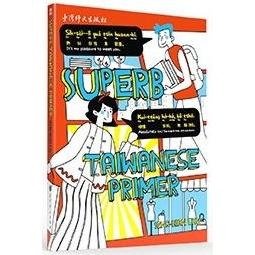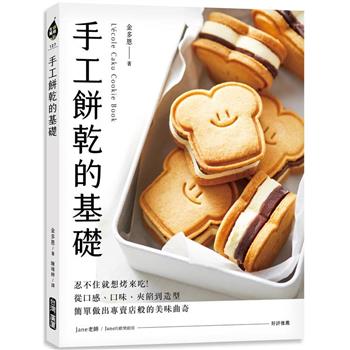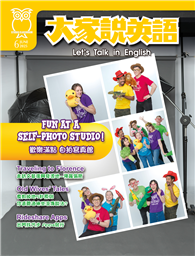本書以主題會話為軸線,隨句附上翻譯及單詞。會話詳細標註各音節聲調,由基礎發音開始,包括聲調、變調乃至台語文的特有的變調原則。
不同於一般語言教材,本書將常用的功能詞、特殊句型作為獨立單元,同時就台語語法特點進行說明。書中導入線上辭典及輸入法工具等學習資源,蒐錄日常生活中常見的俚俗用語,利於學習者自學及日常情境活用。
This book features topic-based conversations. Each sentence is provided with translation and vocabulary. Every syllable is marked with music notes indicating the tone pattern. Here you learn not only vowels and consonants, tones and tone sandhi of words, but also tone sandhi rules applied to the whole sentence.
What makes this book unique: treating commonly used function words and special sentence patterns as independent units; explaining grammatical features; providing online resources, such as dictionaries and input methods. Slangs and idioms often used in daily life are also included.
作者簡介:
國立臺灣師範大學臺灣語文學系副教授
國立清華大學語言學研究所博士
研究專長:句法學、句法語用介面、語意學、台語句法
個人介紹:https://sites.google.com/view/lausenghian/home
Seng-hian Lau is an associate professor of Taiwanese Culture, Languages and Literature, National Taiwan Normal University. He received his Ph.D. in Linguistics from National Tsing Hua University, Taiwan. He has been teaching Taiwanese to international students at various universities. His research interest covers comparative syntax, semantics and syntax-pragmatics interface.
作者序
This book provides composite materials for learning Taiwanese, suitable for both autodidacts and instructed students. The romanization and characters used are standardized orthography promulgated by Taiwan's Ministry of Education, a must-learn system if you aim to pass the proficiency test organized by the Ministry.
You will find musical notes, Do Re and Mi, under each example sentence. They give you a rough grasp of the tone pattern. You can ‘sing’ the sentences along and find them understandable to a native speaker. You may sound like a Taiwanese speaking robot, but never mind! It’s a useful tool before you master all the tones and sandhi tones. They also help you read a sentence without consulting its audio file.
In this book, we do not confine ourselves to ‘proper language’. You also encounter words and phrases deemed impolite or rude on formal occasions. They help you comprehend the language in the everyday life context. Caution: think twice before uttering words or phrases marked ‘vulgar’.
Both teachers and students can use this book flexibly, according to their course designs or learning purposes. For example, you can use each unit of the lexicon as a vocabulary list for reference, and rearrange the words as you see fit. And there is no need to memorize all the words before moving on.
Due to lack of space, this book is limited only to the language, although extralinguistic information of culture, history, customs, etc. is always interesting and linguistically relevant. Teachers and students are encouraged to explore and communicate other aspects of Taiwan, which will eventually benefit your learning and understanding of the Taiwanese language.
This book provides composite materials for learning Taiwanese, suitable for both autodidacts and instructed students. The romanization and characters used are standardized orthography promulgated by Taiwan's Ministry of Education, a must-learn system if you aim to pass the proficiency test organized by the Ministry.
You will find musical notes, Do Re and Mi, under each example sentence. They give you a rough grasp of the tone pattern. You can ‘sing’ the sentences along and find them understa...
目錄
How to Use This Book 001
To the Reader 002
Chapter 01
1.1〈knowledge〉The Language and Its Speakers 010
1.2〈conversation〉Self-introduction(1) 014
1.3〈conversation〉Useful classroom expressions 016
Chapter 02
2.1〈knowledge〉Vowels 026
2.2〈lexicon〉Useful expressions 028
2.3〈lexicon〉Fruit and snacks 032
2.4〈conversation〉Greeting 034
Chapter 03
3.1〈conversation〉Self-introduction (2) 038
3.2〈conversation〉Borrowing things 042
Chapter 04
4.1〈knowledge〉Consonants 050
4.2〈lexicon〉Family members and relatives 054
4.3〈knowledge〉Pronouns 058
4.4〈lexicon〉Numbers 060
Chapter 05
5.1〈activity〉Huah tsiú-kûn / Tâi-uân-kûn 066
5.2〈lexicon〉Classifiers and measure words 068
5.3〈conversation〉Time and date 072
5.4〈knowledge〉Tones 084
Chapter 06
6.1〈conversation〉Eating out 088
6.2〈conversation〉Ordering food 092
6.3〈conversation〉Talking about food 096
Chapter 07
7.1〈conversation〉Hanging out 102
7.2〈conversation〉Bargaining 104
7.3〈activity〉Learning by singing 112
Chapter 08
〈conversation〉Holidays 118
Chapter 09
9.1〈knowledge〉Tone sandhi (1) 132
9.2〈knowledge〉Making a question 134
9.3〈knowledge〉Tone Sandhi (2) 140
9.4〈lexicon〉Colors 142
Chapter 10
10.1〈conversation〉Hobbies 148
10.2〈activity〉Learning by singing 154
Chapter 11
〈knowledge〉Pronouncing a sentence with the right tones- steps and tips 160
Chapter 12
12.1〈knowledge〉Taiwanese Input Method 168
12.2〈knowledge〉Some General rules for You to Make a Sentence in Taiwanese by yourself 170
12.3〈knowledge〉The object position - A small grammar note 174
Chapter 13
13.1〈conversation〉Asking for directions 178
13.2〈knowledge〉Tone sandhi (3) 186
Chapter 14
14.1〈conversation〉Occupations 192
14.2〈activity〉Learning by singing 198
Chapter 15
15.1〈lexicon〉Grammatical Aspect 204
15.2〈lexicon〉Using verbs expressively 212
Chapter 16
16.1〈lexicon〉Localizers and Location 216
16.2〈lexicon〉Some fixed expressions and colloquial terms 222
16.3〈activity〉Learning by singing 232
16.4〈activity〉Learning by singing 236
How to Use This Book 001
To the Reader 002
Chapter 01
1.1〈knowledge〉The Language and Its Speakers 010
1.2〈conversation〉Self-introduction(1) 014
1.3〈conversation〉Useful classroom expressions 016
Chapter 02
2.1〈knowledge〉Vowels 026
2.2〈lexicon〉Useful expressions 028
2.3〈lexicon〉Fruit and snacks 032
2.4〈conversation〉Greeting 034
Chapter 03
3.1〈conversation〉Self-introduction (2) 038
3.2〈conversation〉Borrowing things 042
Chapter 04
4.1〈knowledge〉C...

 共 6 筆 → 查價格、看圖書介紹
共 6 筆 → 查價格、看圖書介紹











